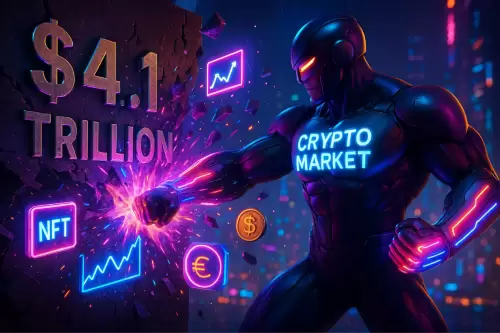 |
|
 |
|
 |
|
 |
|
 |
|
 |
|
 |
|
 |
|
 |
|
 |
|
 |
|
 |
|
 |
|
 |
|
 |
|
Cryptocurrency News Articles
Clarification on the scope of regulation under Part 9 of the Financial Services and Markets Act 2022
Jun 11, 2025 at 12:11 pm
This media release clarifies the scope of regulation under Part 9 of the Financial Services and Markets Act 2022

On 30 June 2025, Part 9 of the Financial Services and Markets Act 2022 ("FSMA") and other miscellaneous provisions will come into effect. A licence under Part 9 of the FSMA may be required in the following circumstances:
* if you are an "Affected Person" (generally, a person performing financial services in respect of an asset class covered by Part 9 of the FSMA); and
* if your activity constitutes a "regulated activity" (generally, providing a service in respect of a "digital token").
On 6 June 2025, the Monetary Authority of Singapore ("MAS") published a media release clarifying the scope of regulation under Part 9 of the FSMA. We set out some clarifications on the scope and applicability of Part 9 of the FSMA, based on common queries that we have encountered.
1. What types of activity are covered by Part 9 of the FSMA?
Part 9 of the FSMA covers "digital tokens". This refers to both (a) DPTs (e.g. cryptocurrencies such as Bitcoin, Ether, and Litecoin, as well as single-currency stablecoins such as USDC and USDT); and (b) tokens of capital market products (e.g. tokenised equities, tokenised debentures, and tokenised units in fund). Part 9 of the FSMA does not cover "conventional" capital markets products (i.e. capital markets products that are not in "token" form). If one is handling assets that do not fall within the definition of "digital token", then it is likely that Part 9 of the FSMA will not apply. Having said that, if the assets being handled are financial instruments, other Acts (e.g. the Main Acts) may still apply to your activities.
By way of illustration, if you are providing securities brokerage services in relation to conventional, non-tokenised equities, such an asset class is not a "digital token" unser the FSMA (since, in the current context, this only applies to a digital representation of an equity that can be transferred, stored, or traded electronically). However, even though Part 9 of the FSMA will not apply to the activity, you may still be conducting a regulated activity under the SFA, triggering licensing requirements unless exempt (from licensing).
2. What should Affected Persons do next?
If you are an Affected Person and you believe your activities may constitute regulated activities (e.g. the services that you provide to customers involve assets that are DPTs or capital markets products (whether in token form or otherwise)):
* You should, in the first instance, consider whether you require a licence under the Main Acts (including whether you meet the standards for licensing under the Main Acts and whether your business has a strong "nexus" to Singapore such as servicing customers in Singapore), or whether you can rely on a licensing exemption under the Main Acts.
* Alternatively, you may wish to consider whether it is possible to restructure your activities, such that they do not amount to regulated activities in Singapore.
* This should be your primary focus, as Part 9 of the FSMA is not meant to be an alternative licensing regime to the licensing regimes under the Main Acts. There will only be extremely limited circumstances under which MAS will grant an FSMA licence, and MAS has said that it will generally not be issuing licences under the FSMA.
3. What if I am already licensed or exempt (from licensing) under the Main Acts?
If you are an Affected Person and you are already licensed or exempt (from licensing) under the Main Acts:
* You will likely be exempt from licensing under the FSMA (for the same activity that you are licensed or exempt from under the Main Acts).
* You will generally not be restricted from offering your regulated services to customers outside of Singapore, but you should check whether your activities (in respect of these customers outside of Singapore) trigger issues of foreign law.
4. What if I am an employee of a foreign company and I am resident in Singapore?
If you are an employee of a foreign company (i.e. the company that employs you is not a Singapore-incorporated company) and you are resident in Singapore, the work you do for that foreign company should not in itself trigger FSMA licensing requirements. However, you should consider whether your activities in Singapore are regulated and trigger regulatory issues under the Main Acts, in respect of the foreign company. For example, some provisions in the Main Acts provide for extraterritorial effect (e.g. section 339 of the SFA provides for the extraterritorial effect of provisions in the SFA, including licensing requirements, if acts are done "partly in" Singapore). A company (even a foreign company) may also be viewed as operating a business "in Singapore" if it has employees located predominantly in Singapore.
Disclaimer:info@kdj.com
The information provided is not trading advice. kdj.com does not assume any responsibility for any investments made based on the information provided in this article. Cryptocurrencies are highly volatile and it is highly recommended that you invest with caution after thorough research!
If you believe that the content used on this website infringes your copyright, please contact us immediately (info@kdj.com) and we will delete it promptly.






























































